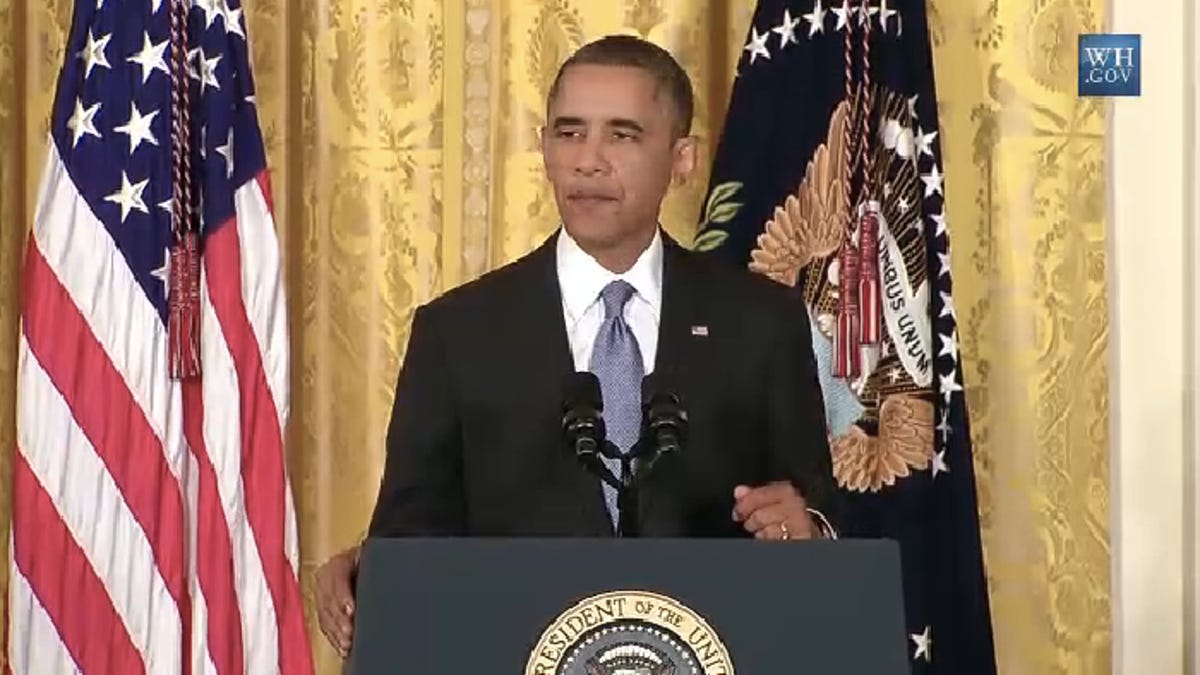President Obama outlines four NSA reform initiatives
While talking about reforms for the intelligence community, the president says the NSA is following the law and not violating the Constitution.

President Barack Obama defended the government's intelligence gathering policies, but outlined four initiatives to assuage concerns among Americans and foreigners regarding the legality of U.S. surveillance activities.
"The programs are operating in a way that prevents abuse...the question is how do I make the American people more comfortable," the president said, responding to questions during a press conference at the White House Friday. "If the American people examine exactly what is taking place and what the safeguards were...they would see that the folks are following the law."
He added that revelations in the news have depleted public trust, and called for more dialog and transparency. "If there are additional things to do to build that trust back up, we should be doing it," he said."People may have better ideas and jigger slightly the balance between the information we can get versus incremental encroachments on privacy," he said.
The president's remarks came on the same day the Guardian, via a top-secret document that came from former National Security Agency system administrator Edward Snowden, confirmed prior reports that the government has a secret backdoor, under a legal authority, that allows it to search for emails and phone calls of U.S. citizens without a warrant.
The first initiative will seek "appropriate reforms" to Section 215 of the Patriot Act, which deals with the government collecting data from Americans' phone calls.
"After having a dialogue with members of Congress and civil libertarians, I believe that there are steps we can take to give the American people additional confidence that there are additional safeguards against abuse. For instance, we can take steps to put in place greater oversight, greater transparency and constraints on the use of this authority," he said. The Obama administration published today a white paper, titled "Bulk Collection of Telephony Metadata Under Section 215 of the USA Patriot Act."
Secondly, Obama said he would work with Congress to improve the public's confidence in the oversight conducted by the Foreign Intelligence Surveillance Court, which provides judicial review of intelligence activities.
"To build greater confidence, I think we should consider some additional changes to the FISC. One of the concerns that people raise is that a judge reviewing a request from the government to conduct programmatic surveillance only hears one side of the story, may tilt it too far in favor of security, may not pay enough attention to liberty," he said. "And while I've got confidence in the court and I think they've done a fine job, I think we can provide greater assurances that the court is looking at these issues from both perspectives -- security and privacy. So specifically, we can take steps to make sure civil liberties concerns have an independent voice, in appropriate cases, by ensuring that the government's position is challenged by an adversary."
Third, the president is directing the intelligence community to make more information public about its spying programs. "We've already declassified unprecedented information about the NSA, but we can go further. So at my direction, the Department of Justice will make public the legal rationale for the government's collection activities under Section 215 of the Patriot Act," Obama said.
The NSA is also planning to have a full-time civil liberties and privacy officer and a Web site to further transparency. "This will give Americans and the world the ability to learn more about what our intelligence community does and what it doesn't do, how it carries out its mission and why it does so," he said.
Fourth, Obama will work with a group of outside experts to review intelligence and communications technologies. "We need new thinking for a new era. We now have to unravel terrorist plots by finding a needle in a haystack of global telecommunications, and meanwhile technology has given governments, including our own, unprecedented capability to monitor communications," he said.
An independent group will review U.S. capabilities, with a focus on surveillance technologies, to come up with ways to build the trust of the American people. The group will file an interim report in 60 days and a final report by the end of year.
The press conference followed a meeting Thursday between Obama and several tech executives, including Apple CEO Tim Cook, AT&T CEO Randall Stephenson, and Google computer scientist Vint Cerf, to discuss surveillance and privacy issues and the role of technology.
NSA Director Keith Alexander announced Thursday that the spy agency plans to automate more of its security infrastructure with a goal of eliminating 90 percent of the estimated 1,000 system administrators who have access to the kind of secret information that was exposed by Edward Snowden.
The president and his family leave for a 9-day vacation at Martha's Vineyard, Mass., on Saturday.

